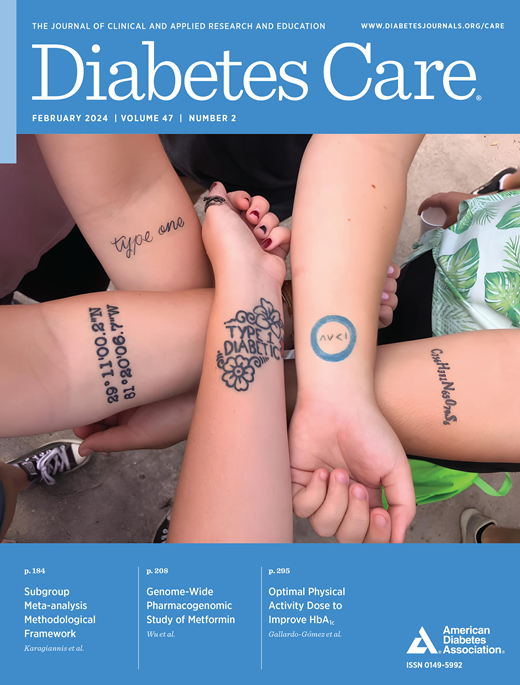Alcohol Intake, Drinking Pattern, and Risk of Type 2 Diabetes in Three Prospective Cohorts of U.S. Women and Men
IF 16.6
1区 医学
Q1 ENDOCRINOLOGY & METABOLISM
引用次数: 0
Abstract
OBJECTIVE Although the adverse effects of excessive alcohol consumption are well established, the association between light to moderate alcohol consumption (≤30 g ethanol per day) and risk of type 2 diabetes (T2D) remains controversial and holds substantial public health implications. We aimed to examine the association of total alcohol intake and drinking pattern with T2D among three cohorts, Nurses’ Health Study (NHS), Nurses’ Health Study II (NHSII), and Health Professionals Follow-up Study (HPFS). RESEARCH DESIGN AND METHODS Former regular drinkers were excluded from baseline nondrinkers. Hazard ratios (HRs) and 95% CIs were estimated by Cox models. RESULTS Over 3 decades of follow-up, 20,551 T2D cases were documented among 200,969 participants. Total alcohol intake was associated with a lower risk of T2D, either using nondrinkers or 0.1–4.9 g/day as the reference. The association was robust to extended latency periods and alternative modeling of exposure. Drinking frequency was associated with a lower T2D risk. For example, compared with drinking 1–2 days per week, the HRs (95% CIs) for drinking 5–6 days were 0.73 (0.65, 0.83), 0.73 (0.62, 0.86), and 0.76 (0.67, 0.86) in the NHS, NHSII, and HPFS cohorts, respectively. When modeled jointly, the lower risk of T2D among drinkers was primarily driven by the drinking frequency. The inverse association began at drinking 1–2 days per week in women and 3–4 days per week in men and was strongest for ≥5 days per week, regardless of drinking <10 g or ≥30 g per drinking day. CONCLUSIONS Light to moderate alcohol consumption, especially regular light drinking, was associated with a lower risk of T2D in both men and women.美国女性和男性三个前瞻性队列的酒精摄入量、饮酒模式和2型糖尿病风险
虽然过度饮酒的不良影响已经得到证实,但轻度至中度饮酒(每天≤30 g乙醇)与2型糖尿病(T2D)风险之间的关系仍存在争议,并具有重大的公共卫生意义。我们的目的是在护士健康研究(NHS)、护士健康研究II (NHSII)和卫生专业人员随访研究(HPFS)三个队列中检查总酒精摄入量和饮酒方式与T2D的关系。研究设计和方法将以前经常饮酒者排除在基线不饮酒者之外。采用Cox模型估计风险比(hr)和95% ci。结果在30年的随访中,在200,969名参与者中记录了20,551例T2D病例。无论是以不饮酒者还是以每天0.1-4.9克为参照,总酒精摄入量与较低的T2D风险相关。这种关联对于延长的潜伏期和暴露的替代建模是稳健的。饮酒频率与较低的T2D风险相关。例如,与每周饮酒1-2天相比,在NHS、NHSII和HPFS队列中,饮酒5-6天的hr (95% ci)分别为0.73(0.65,0.83)、0.73(0.62,0.86)和0.76(0.67,0.86)。当联合建模时,饮酒者患糖尿病的风险较低主要是由饮酒频率驱动的。女性每周饮酒1-2天,男性每周饮酒3-4天时开始出现负相关,每周饮酒≥5天时最明显,无论每天饮酒10克或≥30克。结论:轻度至中度饮酒,尤其是定期轻度饮酒,与男性和女性较低的T2D风险相关。
本文章由计算机程序翻译,如有差异,请以英文原文为准。
求助全文
约1分钟内获得全文
求助全文
来源期刊

Diabetes Care
医学-内分泌学与代谢
CiteScore
27.80
自引率
4.90%
发文量
449
审稿时长
1 months
期刊介绍:
The journal's overarching mission can be captured by the simple word "Care," reflecting its commitment to enhancing patient well-being. Diabetes Care aims to support better patient care by addressing the comprehensive needs of healthcare professionals dedicated to managing diabetes.
Diabetes Care serves as a valuable resource for healthcare practitioners, aiming to advance knowledge, foster research, and improve diabetes management. The journal publishes original research across various categories, including Clinical Care, Education, Nutrition, Psychosocial Research, Epidemiology, Health Services Research, Emerging Treatments and Technologies, Pathophysiology, Complications, and Cardiovascular and Metabolic Risk. Additionally, Diabetes Care features ADA statements, consensus reports, review articles, letters to the editor, and health/medical news, appealing to a diverse audience of physicians, researchers, psychologists, educators, and other healthcare professionals.
 求助内容:
求助内容: 应助结果提醒方式:
应助结果提醒方式:


